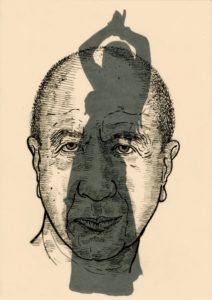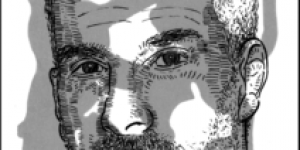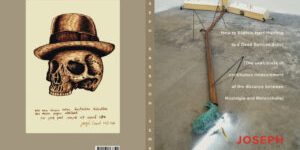The Ballet Dance Of The Pita In The Hummus Plate
No Comments yetI begin in the East: East is the crown that Mohamed Abd el-Wahab placed on the head of “Cleopatra.” East is the dust left by a galloping horse on the road between Ras Mohammed and Nuweiba. East is the ballet dance of the pita on the hummus plate. East is a bag of tears hidden in the corridor of Umm Kulthum’s throat. East is Mahmoud Darwish’s suitcase. East is two lines by Omar Khayyam: “Ah could I hide me in my song, To kiss thy lips from which it flows!”. East is the space between ‘tfadl’ (Arabic for “please”) to sahten (Arabic for “well done”) חסרה שורה על סבא סלח . East is Grandmother Haviva’s plate of rice. East is a yellowing picture of palm trees on the banks of the Tigris. East is where the sun rises every day.
Umm Kulthum was the first singer I ever heard. She was the queen of the gramophone at the café on Struma Square. My grandfather had a regular table there, and he took me there every morning. It was a five minute walk from the transit camp on the border of Holon-Bat Yam. He spoke only Arabic. The black box of his memoirs contained the gap between the Tigris and the Euphrates. From time to time, he would turn his head to me and wet my lips with drops of arak. Other children, for example, learned to recognize lions from books or at the zoo. The first lions I saw were the ones printed on the arak bottle labels. My first king of the jungle had a combed mane and it was wet from the drops of the drink, which was well blended with the smell of the jasmine branches that the owner of the café placed in vases on the tables every morning. Umm Kulthum’s voice mingles in my head with the sound of the backgammon dice and the murmurs of the men who whispered every word along with her. Her picture, which hung on the wall, frightened me. She was the great woman from the dreams. Not my dreams. But my grandfather would translate lines from her songs into fractured Hebrew for me and try to fish from my eyes half of the lust that flooded his own.
My friends were in kindergarten back then. They sang Shavuot songs like “Baskets on our Shoulders” and others, which polished the Hebrew in their throats, while I was captivated by the hammering of a woman’s voice that struck a lost, distant love. Later, when she sang: “I accustomed my eyes to watch you/if you do not come one day/ that day will be erased from my life”. I believed secretly that these lines were directed at me, too.
Then I heard other voices, but the ritual of hearing her new song on the first Thursday of every month continued. My parents knew that she was Nasser’s singer, and that he was an enemy, and she would often sing to the Egyptian soldiers in order to sharpen their bayonets, which were aimed at us. But in the face of her magical voice, even reason released its grip.
Umm Kulthum is present in the poems I wrote about her as well as in the sense of power of an entire orchestra that lays out a carpet for her vocal chords. I learned from her how to unravel threads from the same carpet and how to weave poetry from them, association after association. She reminds me that I was born in Baghdad.
I wrote my first poems when I was sixteen and a half years old. The secret drawer was locked. I played basketball then and my coach asked us to shoot fifty baskets every day. When I went to the school’s basketball court, I found Amnon Navot there. We had an agreement. He brought back all the balls that didn’t touch the net, and in return I listened to the poems he recited. Thus, against the soundtrack of the bouncing balls, Amnon recited Avidan, Amichai, Guri, Dor, Ravikovitch, and Wallach, Wieseltier, Horowitz, Penn, Gilboa, Alterman and once even half a story by Kaniuk. In his school bag were poetry books and copies of the journal Achshav. Navot was the engine and I connected the cars of association. “Just a little blood to top off the honey,” he would shout, and since then I have been running on the bridge with the poems running after me.[1] I sent the first poems to David Avidan. He answered immediately, read one of my poems on a radio program, and even called me when my first poem was published in the literary supplement of Ma’ariv (edited by David Giladi). Avidan was, in my eyes, the hard asphalt that paved the “roads that take off slowly.”[2] He was the “cutting and simple fact we have nowhere to go.”[3] He was the poet who had been cut out of the dream journal. The musical scale of his songs reminded me more off a rock and roll stadium than a concert hall.
In the last year of my military service, I worked with street gangs in Beit Shemesh. Before that I had worked in the Ktzi’ot prison. The difficulty of making the transition to working with a street gang was primarily mental. In the soldier’s library one could find a copy of Sartre’s “Intimacy,” while the only reading materials these youth had were arrest warrants. I never believed until then that one could actually grow up without Pink Floyd’s “Atom Heart Mother” or conduct a debate for a whole night on the difference between the detention cell at the Russian Compound and the one at the police station in town. From these adolescents I learned that a knife is first of all a knife and only secondly a metaphor for a knife. I learned that the first rule of the jungle is that there are no rules and, first and foremost, that when you bang your head against the wall, there’s a good chance the wall will break too.
Once a week I ran away from there. The city of refuge was called a creative writing workshop. I was suspicious of the meeting with other writers, yet fascinated. “Each and every man” Halfi once wrote, “is a little pope in the Vatican of his life.” But the real popes were the workshop teachers. Yehuda Amichai spoke about his diet and his sense that he would not teach how to write, but how to erase. Dan Pagis empowered the word “reduction.” T. Carmi painted our faces in Indians war paints when he presented three lines of a poet with an eagle eye, and Amir Gilboa sat facing us, poems engraved on his forehead. There was a sense that the poets had suddenly fallen from the shelf and become flesh and blood. But more than what happened in the room happened in the road between Batei Mahase Square and Jaffa Gate. It was a Socratic walk. Amichai taught me that poetry can also be in a vendor’s tomato box in the Old City, and Amir Gilboa would always stop by the Armenian’s tattoo shop and say “one day you will write a poem about it.” I am a student of both of them. I learned from Gilboa that resting the pen on a paper resembles placing a gun to the temple and from Amichai I learned that that same gun does not forget the finger that pulled the trigger.
“Poetry,” said Christopher Frey, “is the language in which man explores his own amazement.” To this amazement I’m adding a scratch.
The first cultural war in which I participated took place between the Elvis Presley camp and the Cliff Richard camp. Cliff’s people were, usually, the good kids from the youth movements. We, the Elvis people, were a metaphor that could ride on the back seat of a motorcycle. It was enough to hear a song of his in order to dress the words in black leather suits and boots designed for the gas pedal only. There were no thoughts, for example, about a mechanic’s black nails after cleaning a tail pipe. I wondered then how, in the movies, Elvis came out of the pool with his hair perfectly combed and brilliantined, exactly as it had been before he jumped in, every time. In general, by the way, this relationship between brilliantine and Elvis reminds me of Sabah, the king of the neighborhood of my youth. Sabah grew out his short hair just so he could dress it with brilliantine. Clearly he was an Elvis man, and clearly he dreamed of a motorcycle. His father went out in his pajamas to buy ice, and Sabah, alongside him, was the proof that a renewed meeting between father and son could have only occurred in a synagogue. Once he received a gift, a ticket for Cliff Richard’s concert at the Ramat Gan stadium. On the day of the concert, he deliberated whether he should go to the concert or burn the ticket. Cliff has never been seen holding the handlebars of a motorcycle even in his imagination, and the result was that I can smell the burning of the ticket to this day.
I’m re-painting the war colors of this distant argument, because at the end of the day it is a poetic disagreement. This is an argument over wording. Or, in other words, is it possible to sing only about a rose or are we required in a song about a rose to mention the thorns that also grow on its stem? I already liked the thorns back then. The music was the tunnel and the headlights of the car were the light at its end. Therefore, Elvis’s rock and roll took me to the suicidal voice of Jim Morrison, to Eric Clapton’s guitar, which knew how to tighten fingers into a fist, to the alcohol-soaked voice of Marianne Faithfull, and especially to the minefield New York’s avant-garde. Elliott Sharp, the musician with whom I recorded several pieces, plays like he is sweeping plucked feathers from the floor of the slaughterhouse. “Music,” I wrote about him, “is never the last request/emitted by the lips of the victim in the face of the guns/it is the path of escape in the rusty heart of the barbed wire fences.” In my poems, I attempt to glorify that rust.
P.S. And perhaps I can reduce the whole story to the two years during which I stammered. To two years of near silence. The silent person, especially if he is nine years old, is the ultimate listener. The silent person is an avenger.
נקמת הילד המגמגם
הַיּוֹם אֲנִי מְדַבֵּר לְזֵכֶר הַמִּלִּים שֶׁפַּעַם נִתְקְעוּ לִי
בַּפֶּה,
לְזֵכֶר גַּלְגַּלֵּי הַשִּׁנַּיִם שֶׁפּוֹרְרוּ הֲבָרוֹת
מִתַּחַת לַלָּשׁוֹן וְהֵרִיחוּ אֶת אֲבַק הַשְּׂרֵפוֹת
בָּרֶוַח בֵּין הַלֹּעַ לַשְּׂפָתַיִם הַחֲשׁוּכוֹת.
חָלַמְתִּי אָז לְהַבְרִיחַ אֶת הַמִּלִּים שֶׁנֶּאֶרְזוּ כְּסְחוֹרוֹת גְּנוּבוֹת
בְּמַחְסְנֵי הַפֶּה,
לִקְרֹע אֶת אֲרִיזוֹת הַקַּרְטוֹן וְלִשְׁלֹף אֶת
צַעֲצוּעֵי הָאלף-בית.
הַמּוֹרָה הָיְתָה מַנִּיחָה יָד עַל כְּתֵפִי וּמְסַפֶּרֶת שֶׁגַּם מֹשֶה
גִּמְגֵּם וּבְכָל זֹאת הִגִּיעַ לְהַר סִינַי.
הָהָר שֶׁלִּי הָיָה יַלְדָּה שֶׁיָּשְׁבָה
לְיָדִי בַּכִּתָּה, וְלֹא הָיְתָה לִי אֵשׁ בִּסְנֵה הַפֶּה
כְּדֵי לְהַבְעִיר, לְנֶגֶד עֵינֶיהָ,
אֶת הַמִּלִּים שֶׁנִּשְׂרְפוּ בְּאַהֲבָתִי אוֹתָהּ.
Revenge of the Stuttering Child
I speak today in memory of the words which once stuck in my mouth
in memory of the toothy gears which crushed syllables
under my tongue and smelled the gunpowder
in the gap between the gullet and the arid lips.
My dream then was to smuggle the words packed like stolen goods
in the mouth’s warehouse,
to rip the cardboard boxes open and pull out the
toys of the alphabet.
The teacher would lay a hand on my shoulder and say that Moses, too,
stuttered but nonetheless made it to Mt. Sinai.
My mountain was a girl who sat
next to me in class, and I had no fire in the bush of my mouth
to ignite, before her very eyes,
the words consumed by my love of her.
Poem translated by Vivian Eden
Notes
[1] This is a reference to the poem “Jonathan” by Yonah Wallach. This line is taken from Linda Zisquit’s translation in Wild Light. Sheep Meadow Press, New York, 1997, 1-878818-54-6.
[2] This is a reference to Avidan’s poem “The Streets Take off Slowly.”
[3] This is from the poem “Power of Attorney” by David Avidan.
Ronny Someck: http://www.ronnysomeck.com/
You May Also Like
Comments
Leave a Reply







